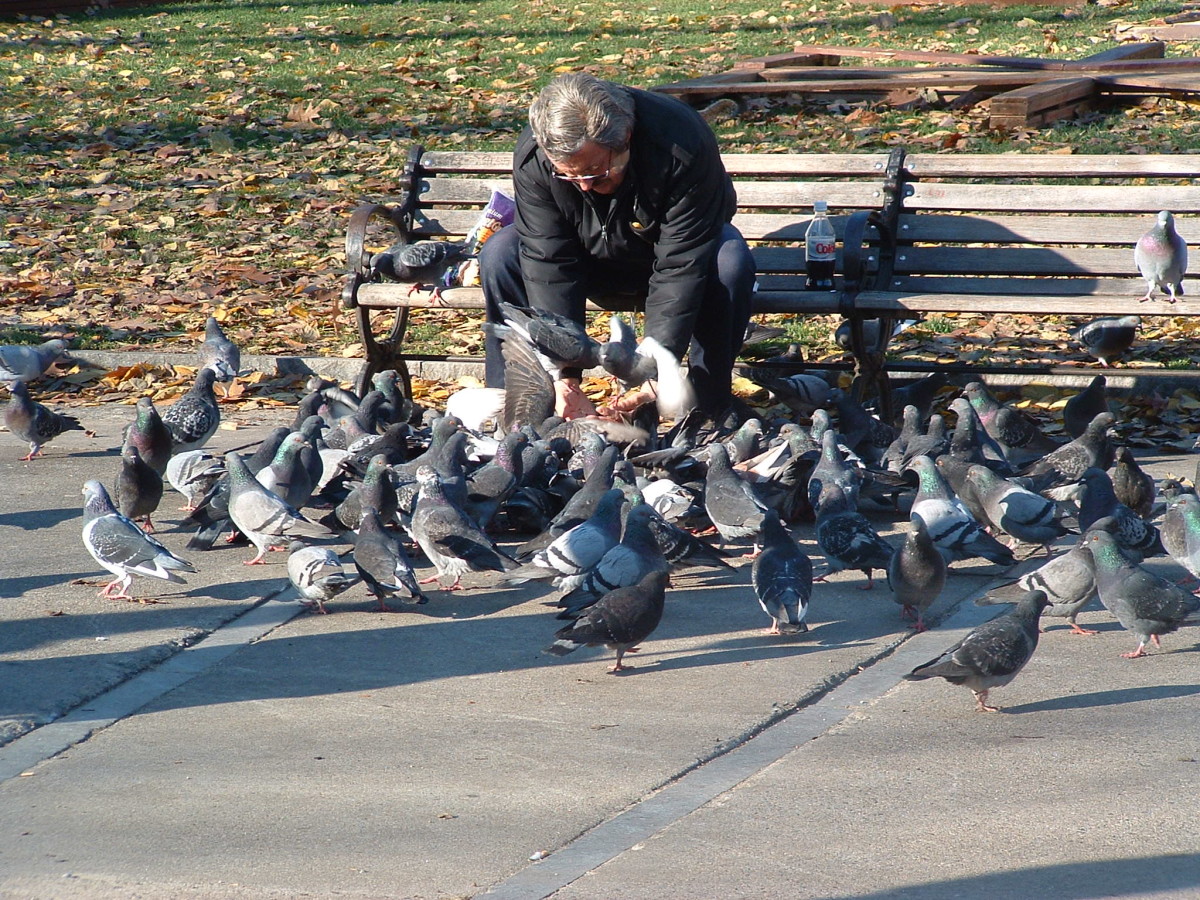Baby pigeons, also known as squabs, are small and cute fledglings that resemble adult pigeons. We will explore the characteristics, lifecycle, and care of these adorable avian babies.
From the moment they hatch, baby pigeons are covered in soft, downy feathers and have closed eyes. They rely on their parents for nourishment and protection until they are ready to venture out on their own. As they grow, their feathers develop and their eyes open, allowing them to explore their surroundings.
Baby pigeons undergo a period of rapid growth and maturation, learning essential skills such as flying and foraging for food. We will delve into the fascinating world of baby pigeons and provide insights on how to care for these vulnerable creatures.

Credit: www.amazon.com
Characteristics Of Baby Pigeons
Baby pigeons exhibit distinct physical attributes during their various developmental stages. These characteristics play a crucial role in understanding their growth process. As fledglings, baby pigeons possess fluffy down feathers and small, underdeveloped wings. Their beaks are short and soft, allowing them to be fed by their parents.
As they mature, their feathers gradually replace the down, developing into sleek and sleek plumage. Their wings also develop, enabling them to practice flight and explore their surroundings. Additionally, baby pigeons start growing larger, becoming more similar in size to adult pigeons.
These physical changes signify their progression from helpless hatchlings to self-sufficient birds capable of surviving independently in their environment. Understanding the physical attributes of baby pigeons provides valuable insights into their growth and development.
Caring For Baby Pigeons
Caring for baby pigeons involves creating a suitable habitat that meets their needs. Providing a warm and secure environment is essential for their well-being. When it comes to feeding and nutrition, it is important to offer a balanced diet that includes pigeon-specific formula and a variety of seeds.
Monitoring their eating habits and adjusting their diet accordingly is crucial. Additionally, ensuring access to clean water at all times is vital for their hydration. Observing their growth and development on a regular basis is necessary to identify any potential health issues.
Providing appropriate veterinary care, if needed, is essential. It is vital to handle baby pigeons with care and avoid unnecessary stress. Creating a calm and soothing atmosphere will help them thrive. Overall, caring for baby pigeons requires attention to detail and a compassionate approach.
Bonding And Training Baby Pigeons
Baby pigeons are vulnerable creatures that require a lot of care and attention. Bonding with them is essential for establishing trust and socialization. Spend time with your baby pigeon, gradually gaining its trust and building a strong connection. This can be done by handling them gently and providing a safe environment.
Start with basic commands such as “step up” and “stay. ” Patience is key as pigeons are intelligent animals but may take time to understand and respond to these commands. Use positive reinforcement techniques like treats and praise to encourage their learning.
Training baby pigeons not only improves their behavior but also strengthens the bond between you and your feathered friend. So, invest your time and effort into training and enjoy the rewarding journey with your baby pigeon.
Common Health Issues In Baby Pigeons
Baby pigeons can experience common health issues that require careful attention and timely identification. It is essential to be observant and vigilant in noticing signs of illness in these young birds. Indications such as lethargy, loss of appetite, abnormal droppings, or respiratory distress should not be ignored.
Preventive measures play a crucial role in ensuring the well-being of baby pigeons. Maintaining cleanliness in their environment, providing a balanced and nutritious diet, and regular check-ups with a veterinarian are essential. Regular cleaning of their living space and providing fresh water and food are crucial for disease prevention.
A healthy and hygienic environment coupled with proper nutrition can significantly reduce the risks of common ailments in baby pigeons. Being proactive in identifying potential health issues and taking preventive measures is key to raising healthy and thriving baby pigeons.
Proper Hygiene For Baby Pigeons
Baby pigeons require proper hygiene to ensure their health and well-being. One essential aspect is cleaning and maintaining their habitat. Regular cleaning of the nest, removing waste and replacing soiled bedding, is crucial. This prevents the build-up of harmful bacteria and keeps the environment fresh for the baby pigeons.
Bathing and grooming techniques are also important. Gently washing their feathers with lukewarm water helps remove dirt and parasites. Additionally, trimming their nails can prevent them from getting tangled or injured. It is vital to prioritize hygiene for baby pigeons to promote their overall growth and development.
Proper care and attention will ensure a healthy and happy life for these adorable birds.
Veterinary Care For Baby Pigeons
Proper veterinary care is crucial for baby pigeons. Finding a qualified avian veterinarian is essential to ensure their well-being. Regular check-ups and vaccinations are necessary to keep them healthy. With the right veterinarian, you can provide the necessary care for your baby pigeon.
The Mating Process Of Pigeons
Pigeons have a fascinating mating process that involves courtship rituals and behaviors. During courtship, male pigeons will perform elaborate displays to attract a female. These displays may include puffing up their chests, cooing, and bowing. The male will then offer the female his beak to signal his interest.
If she accepts, they will engage in a ritualized dance, where they circle each other and bob their heads. Once a pair has formed, they will begin to build a nest together using twigs, leaves, and other materials. The female will then lay one or two eggs in the nest, which both parents will take turns incubating.
The eggs will hatch after about 17 to 19 days, and the baby pigeons, called squabs, will be dependent on their parents for food and care until they are ready to fledge and leave the nest.
Incubation And Hatching Of Pigeon Eggs
Incubating and hatching pigeon eggs require precise temperature and humidity control. Maintaining the ideal conditions is crucial for successful development. Regular monitoring of the eggs enables tracking their progress and ensures any necessary adjustments are made. Temperature fluctuations can be detrimental, as they may disrupt the delicate process of embryonic growth.
Similarly, inadequate humidity levels can impede proper hatching. By closely observing the eggs, potential issues can be identified and addressed promptly, maximizing the chances of healthy hatchlings. This careful attention to detail throughout the incubation period plays a vital role in ensuring the successful birth of baby pigeons.
Raising Baby Pigeons After Hatching
Raising baby pigeons after hatching is crucial for their healthy growth and development. The feeding and nurturing process plays a significant role in ensuring their well-being. Providing a comfortable and safe environment is the first step. Establish a consistent feeding schedule to give them the nourishment they need.
Use a specially formulated pigeon food or a homemade mixture of seeds, grains, and legumes. It’s important to monitor their appetite and ensure they’re eating enough. Additionally, ensure they have access to clean water at all times. Regularly clean their living area to maintain hygiene.
Carefully observe their behavior and consult a veterinarian if any health concerns arise. With proper care and attention, you can raise healthy and thriving baby pigeons.
Conclusion
Raising a baby pigeon can be a rewarding and fulfilling experience. As we have explored in this blog post, these tiny creatures require specialized care and attention to thrive. From providing a warm and safe habitat to feeding them a nutritious diet, every aspect of their care is vital to their development.
Additionally, understanding their unique behaviors and needs can help create a strong bond between you and your feathered friend. Remember to give them plenty of social interaction and mental stimulation, as these elements are crucial for their overall well-being. By investing time and effort into their upbringing, you can watch them grow into beautiful, confident pigeons.
Ultimately, taking care of a baby pigeon is not just a responsibility but also an opportunity to witness the wonders of nature up close. Embrace this journey and enjoy the precious moments with your baby pigeon.







